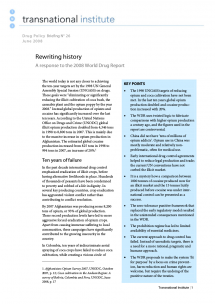Ideas into movement
Boost TNI's work
50 years. Hundreds of social struggles. Countless ideas turned into movement.
Support us as we celebrate our 50th anniversary in 2024.

The 2008 UN World Drug Report tries to hide the failures of drug control policy behind a bad history lesson. Instead of a clear acknowledgement that the UN’s own 10-year targets have not been met, it offers a narrative of 100 years of success, fabricating a comparison with Chinese opium production and use at the turn of the 20th century.

The world today is not any closer to achieving the ten-year targets set by the 1998 UN General Assembly Special Session (UNGASS) on drugs. These goals were “eliminating or significantly reducing the illicit cultivation of coca bush, the cannabis plant and the opium poppy by the year 2008.” Instead global production of opiates and cocaine has significantly increased over the last ten years. According to the United Nations Office on Drugs and Crime (UNODC) global illicit opium production doubled from 4,346 tons in 1998 to 8,800 tons in 2007. This is mainly due to the massive increase in opium production in Afghanistan. The estimated global cocaine production increased from 825 tons in 1998 to 994 tons in 2007, an increase of 20%.
Ten years of failure
In the past decade international drug control emphasised eradication of illicit crops, before having alternative livelihoods in place. Hundreds of thousands of peasants have been condemned to poverty and robbed of a life in dignity. In several key producing countries, crop eradication has aggravated violent conflict rather than contributing to conflict resolution.
By 2007 Afghanistan was producing some 8,200 tons of opium, or 93% of global production. These record production levels have led to more aggressive forced eradication of opium crops. Apart from causing immense suffering to local communities, these campaigns have significantly contributed to the growing insecurity in the country.
In Colombia, ten years of indiscriminate aerial spraying of coca crops have failed to reduce coca cultivation, while creating a vicious circle of human, social and environmental damage, displacement, human right violations and fuelled the decades-old civil conflict in the country.
Opium production in the Golden Triangle (Burma, Thailand and Laos) – once the world’s largest producer - has indeed declined from 1.435 metric tons in 1998 to 472 metric tons in 2007, or 5% of global production. Those who are paying the price for this trend are the opium farmers, who need the income from opium to buy food and medicines.
Key points
Pages: 10